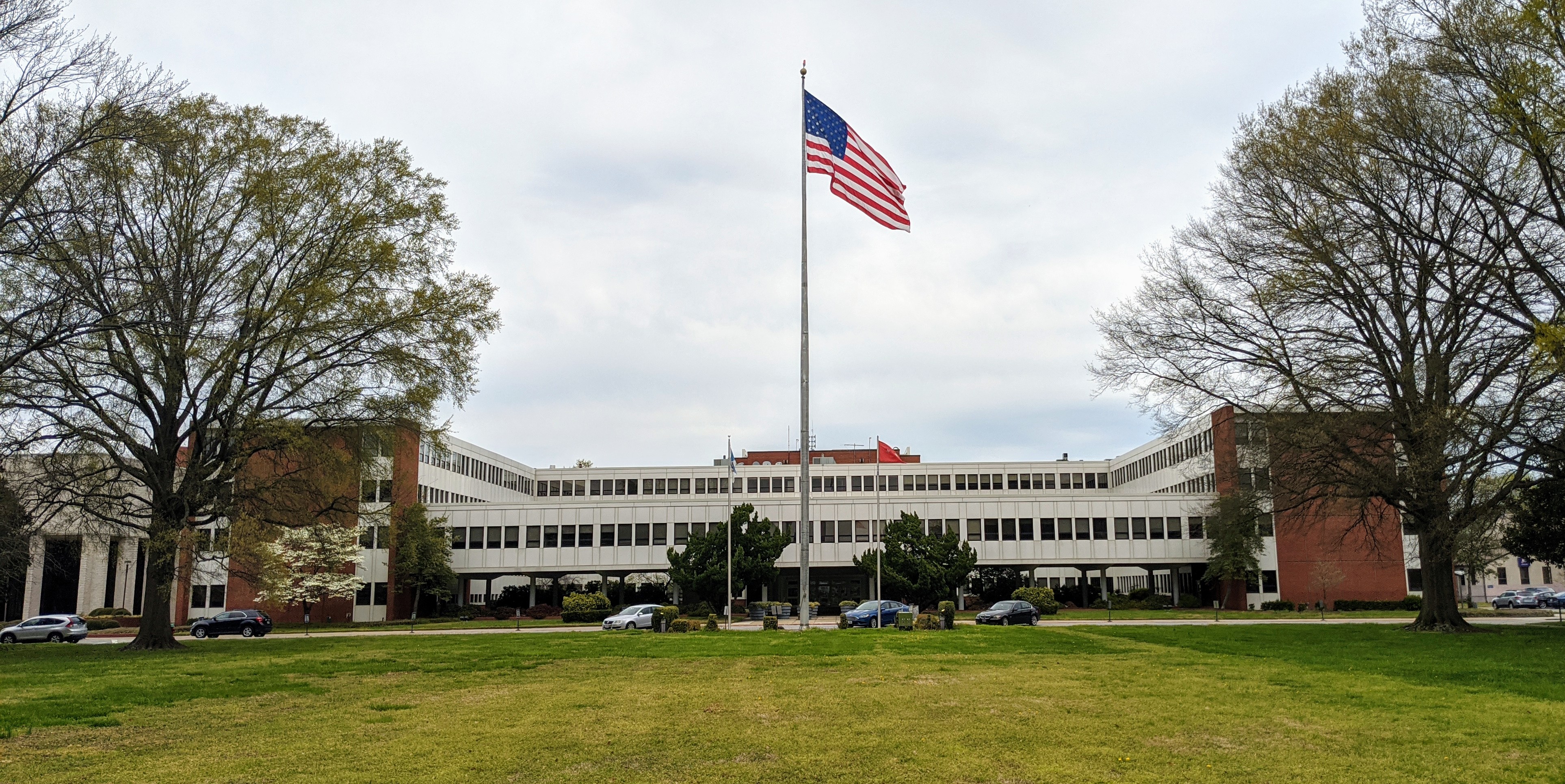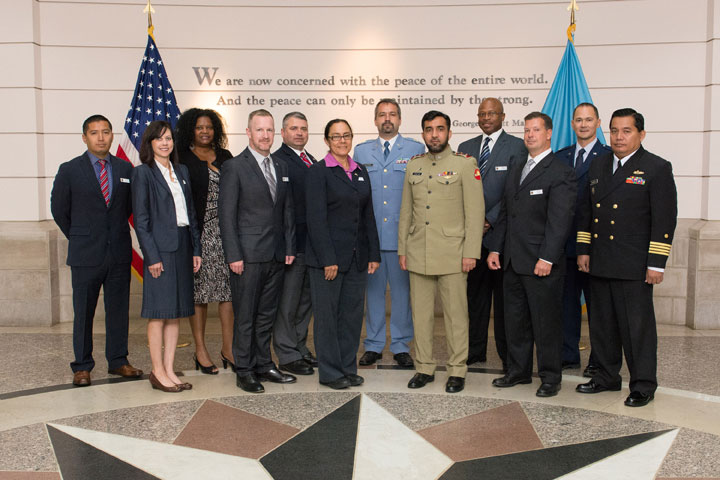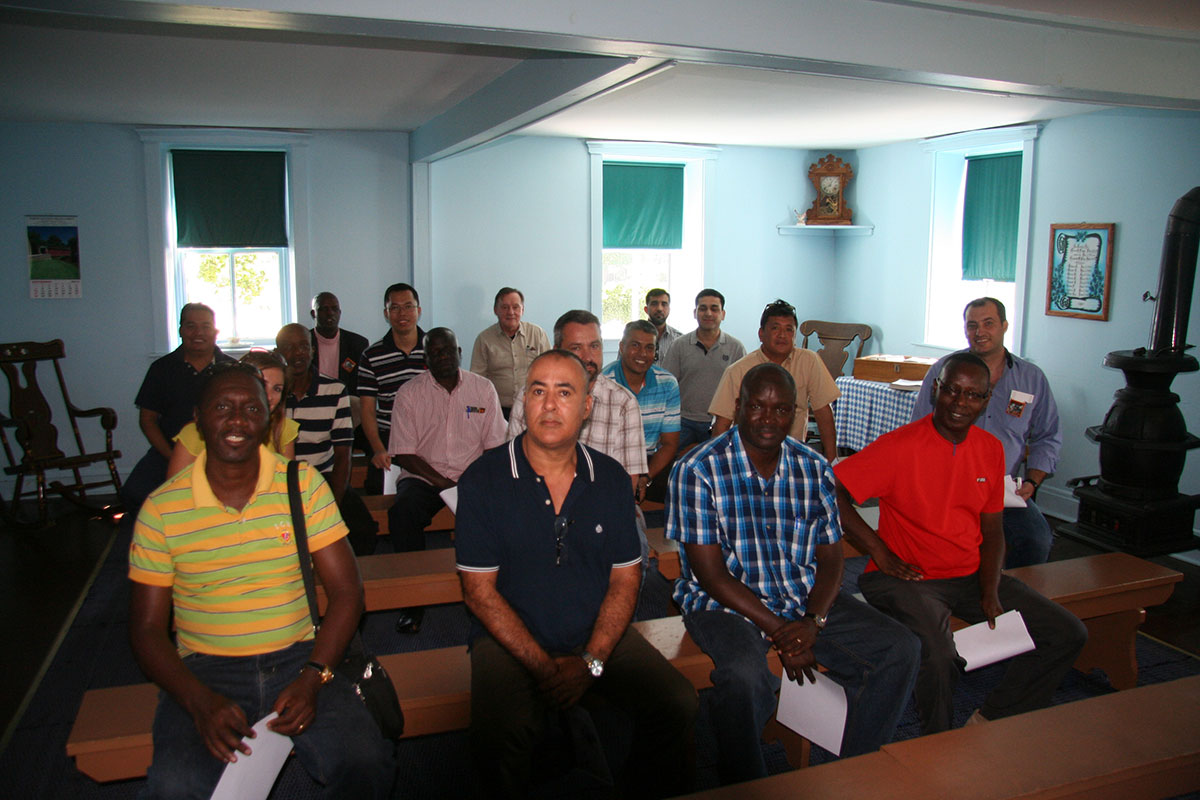Joint Combined Warfighting School
Joint Forces Staff College
 The Joint Combined Warfighting School, or JCWS, is a 10 week course which conducts Phase II of Joint Professional Military Education. JCWS educates national security professionals to plan and execute joint, interagency, intergovernmental, and multinational operations. Graduates are critically-thinking, operationally-minded, skilled joint warfighters who can operationalize national, military, and theater security strategies into design-informed operational plans. Graduates have a primary commitment to joint, interagency, intergovernmental, and multinational teamwork, attitudes, and perspectives. The school accomplishes this through exercises and case studies in a joint seminar environment. JCWS fosters a mutual understanding and rapport that develops when students from all Services share and challenge the ideas, values, and traditions of their Services and solve joint military problems together. The goal of the Phase II program at JCWS is to build on the foundation established by the institutions teaching JPME Phase I. In addition, the faculty and student interaction in the fully joint environment of the JFSC campus cements professional joint attitudes and perspectives essential to future successful military operations. JCWS Resident and Satellite programs are 10-weeks, and the Hybrid program is 40-weeks with three weeks resident and 37 weeks of distance education. These instructional periods will require your full participation, regardless of program modality. Whether you are a Resident, Satellite, or Hybrid student, plan accordingly to achieve the educational requirements while balancing your other roles and responsibilities during this remarkable period in history. The minimum ECL score for international candidates is 80.
The Joint Combined Warfighting School, or JCWS, is a 10 week course which conducts Phase II of Joint Professional Military Education. JCWS educates national security professionals to plan and execute joint, interagency, intergovernmental, and multinational operations. Graduates are critically-thinking, operationally-minded, skilled joint warfighters who can operationalize national, military, and theater security strategies into design-informed operational plans. Graduates have a primary commitment to joint, interagency, intergovernmental, and multinational teamwork, attitudes, and perspectives. The school accomplishes this through exercises and case studies in a joint seminar environment. JCWS fosters a mutual understanding and rapport that develops when students from all Services share and challenge the ideas, values, and traditions of their Services and solve joint military problems together. The goal of the Phase II program at JCWS is to build on the foundation established by the institutions teaching JPME Phase I. In addition, the faculty and student interaction in the fully joint environment of the JFSC campus cements professional joint attitudes and perspectives essential to future successful military operations. JCWS Resident and Satellite programs are 10-weeks, and the Hybrid program is 40-weeks with three weeks resident and 37 weeks of distance education. These instructional periods will require your full participation, regardless of program modality. Whether you are a Resident, Satellite, or Hybrid student, plan accordingly to achieve the educational requirements while balancing your other roles and responsibilities during this remarkable period in history. The minimum ECL score for international candidates is 80.
Learn more →
Joint Information Operations Planner's Course
Joint Forces Staff College
The mission of the Joint Information Operations Planners Course (JIOPC) is to establish a common level of understanding for IO planners and IO capability specialists who will serve in joint operational-level IO billets. This course is for personnel assigned to the Joint IO career force. The primary objective of the JIOPC is to educate and train military students between the ranks of 0-3 through 0-6, and DoD Civilian equivalents, to plan, integrate, and synchronize IO into joint operational-level plans and orders. The school accomplishes this through a combination of in-residence class presentations, guest lectures, case studies, and practical exercises in a joint seminar environment. Specifically, the course focuses on the following six (6) learning areas:
- Joint Planning Process
- Joint Intelligence Preparation of the Operational Environment (JIPOE)
- IO Planning
- Interagency Planning & Coordination
- Military Deception (MILDEC)
- Operations Security (OPSEC)
Throughout the course the students execute joint panning from an IO perspective. The course is based upon joint doctrine that is reinforced, when necessary, by various tactics, techniques, and procedures from throughout the Department of Defense.
The JIOPC is only taught in residence at the Joint Forces Staff College.
Learn more →
Joint Command, Control, Communications, Computers, and Intelligence/Cyber Course (JC4I Cyber Course)
Joint Forces Staff College
In order to better support today's high OPTEMPO, the Joint Command, Control, Communications, Computers and Intelligence/Cyber Staff and Operations Course (JC4ICSOC) now offers a three-week operational level resident course sponsored by the Joint Staff J6. The mission of the JC4ICSOC is to educate and train joint C4I decision makers in C4I and cyberspace concepts in the joint/ interagency/multinational environments, the DoD's organization and how it supports the C4I process, and the management and operation of current joint C4I systems. Students are required to demonstrate their learning by means of successfully completing an academic paper, classroom paper presentation, and an end of course examination.
The JC4ICSOC aims to:
- Provide students with a broad understanding of approved joint C4I/cyber doctrine and current policy guidance
- Apply thinking of joint C4I concepts and organizations to operational level of warfare (JTF action officer focused)
- Apply skills/procedures for duty in joint or service C4I/cyber staff operations and planning assignments
This course's primary focus areas include Command and Control, Communications and Computer Systems, Cyberspace Operations, Intelligence, Space Operations, Joint Interoperability, and application of Joint C4I concepts.
Learn more →
Chief Information Officer Leadership Development Program
College of Information and Cyberspace

The National Defense University (NDU) College of Information and Cyberspace (CIC) Chief Information Officer Leadership Development Program (CIO LDP, or LDP for short) is the College’s flagship resident program for rising senior-level managers and leaders responsible for promoting and attaining national and international security goals through the strategic use of information and information technology as identified in the CIO competencies. The CIO LDP is administered in an intensive and highly interactive fourteen week forum. The student centered educational experience emphasizes developing leadership skills and abilities while learning CIO content through completion of six courses. The leadership skills and abilities are put into practice and the learned knowledge is employed as students participate in a domestic field study. The domestic field study examines how private and public sector organizations implement CIO competencies. CIO LDP students form a learning community that fosters multiple perspectives on a wide range of issues.
Learn more →
Cyber Leadership Development Program
College of Information and Cyberspace
The College of Information and Cyberspace Cyber Leadership Development Program is an Executive Leadership Program designed to focus on the integration of cyberspace and national security. The program is designed to provide a broad range of leaders with a deeper understanding of how effective leadership in the cyber domain is pivotal to the success of U.S. and international security.
This intensive 14-week program assembles National Defense University Faculty, senior government policy makers, and technical experts to provide participants with competencies in cyberspace and national security. The educational experience includes extensive seminar instruction, site visits, travel, and practicum. This program emphasizes developing knowledge, skills, and abilities associated with the leadership in the cyber workforce. Successful completion provides graduates with five graduate course equivalents and a graduate certificate in Cyber Leadership.
The program is conducted in person on the National Defense University Campus, in Washington, D.C.
Learn more →
Reserve Components National Security Course
College of International Security Affairs
RCNSC is a 2-week seminar offered to senior officers (O4-O6) and non-commissioned officers (E8-E9) of the U.S. Reserve Components, allied officers, and interagency civilians working in national security. Each course has approximately 120-160 students. The course lays a foundation for students moving on to joint command management and staff responsibilities in a multinational, intergovernmental, or joint national security setting.
The curriculum consists of lectures, panel discussions, seminars, on-site visits and a simulation exercise dealing with national security policy and defense resource management. The presenters are faculty members from The College of International Security Affairs, the National War College, the Eisenhower School for National Security and Resource Strategy, the College of Information and Cyberspace, and other distinguished speakers from the Federal Government, Private Industry and other Universities from around the country.
Learn more →
Homeland Defense Fellows Program
College of International Security Affairs
The Homeland Defense Fellowship (HDF) program is a fourteen week-long program awarding up to eight graduate-level credits to qualified students. Upon completion of the course, the students should be able to think critically about strategic challenges to reduce the preconditions, risks, and effects of terrorism. Students work to increase their understanding of the emerging threats to the homeland and of the possibilities for organizing effective responses. Students leave the program with a certificate of completion. This program is offered at the College of International Security Affairs at the National Defense University campus on Fort McNair.
The HDF program is conducted with both classroom and field experience in homeland defense strategies.
During this course, dependents are not authorized to accompany students.
Learn more →

